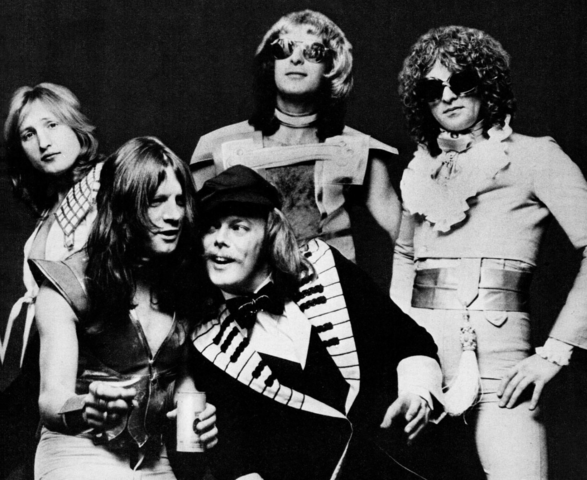Formation as the Doc Thomas Group and as Silence
Mott the Hoople’s origins hark back to Herefordshire, England during the early 1960s. Most of the members came from two groups — The Soulents and The Buddies. In the mid-1960s, these members came together to form Doc Thomas Group. It consisted of Stan Tippin (lead vocals), Pete Overend Watts (bass), Verden Allen (keyboardist) and Dale “Buffin” Grifin (drums).
The Doc Thomas Group recorded and toured sometime in Italy. Over in their home country they would change their name into Silence. Silence then recorded demos and shipped them to various labels, without success. Island Records’ honcho Guy Stevens, however, took an interest in the band. But he wasn’t keen on Tippin as the band’s lead singer, so Stevens replaced him with a new vocalist Ian Hunter. Tippin then took the role as road manager.
Mott the Hoople’s early struggles
It was also Stevens who suggested the name Mott the Hoople after a Willard Manus novel of the same name. Mott the Hoople released their eponymous debut album in 1969, which became a cult favorite. The album was notable for its cover versions of “Laugh at Me” (Sonny Bono), “At the Crossroads” (Sir Douglas Quintet), and “You Really Got Me” (The Kinks).
However, their second LP Mad Shadows (1970) was a critical and commercial misfire. Mott the Hoople’s third album Wildlife (1971) took a risk by incorporating some country music; predictably, it fared even worse than the previous album. Brain Capers (1971) did nothing to improve the band’s commercial stance. The band had staged an ill-fated show at the Royal Albert Hall in the summer of 1971 where a riot broke out.
Enter David Bowie
Mott the Hoople was on the verge of splitting up until David Bowie, a fan of the band, intervened. He convinced them to stay together and agreed to produce their next album, which was to be All the Young Dudes. When they were discussing over the choice of songs to record, Bowie offered “Suffragette City” (which would finally land in his own Ziggy Stardust LP) to the band, but they refused. In the end, Mott the Hoople chose another Bowie-penned song “All the Young Dudes.”
A hit, at last!
The single “All the Young Dudes” was released in July 1972 and eventually it became their breakthrough hit on both sides of the Atlantic. It peaked at #37 on the US Billboard Hot 100 and #3 on the UK singles chart. The album reached at #21 on the UK albums chart, while it peaked at #89 on the Billboard 200. All of a sudden they transformed themselves into a glam rock act.
Mott the Hoople consolidated their new found success and fame with their next album Mott (1972). Its singles “Honaloochie Boogie” and “All The Way from Memphis” were written by Hunter and Ralphs. They reached #12 and #10 on the UK singles chart, respectively. Mott LP landed at its peak positions #7 (UK album chart) and #35 (US Billboard 200).
Personnel changes
But just as the band was attaining the success they had long dreamed of, they were beginning to disintegrate. Allen had left the band already before they were about to record Mott; Ralphs quit Mott the Hoople to form his own act Bad Company with Paul Rodgers. Ralphs was replaced by Luther Grosvenor (of Spooky Tooth) aka Ariel Bender. Morgan Fisher (of Love Affair and Morgan) joined Mott the Hoople, too.
This newly revamped lineup recorded The Hoople, which became their most successful LP yet, going to #11 on the UK singles chart and #28 on the US Billboard 100. It was also certified gold in their home country. Its first single “Roll Away the Stone” became the group’s best-performing single yet, topping off at #8 on the UK chart. Another single, “The Golden Age of Rock ‘n’ Roll,” stalled at #16.
The band as Mott and as British Lions, and its split
Mick Ronson had replaced Ariel Bender sometime in 1974. Ronson and Hunter then left Mott the Hoople after Ronson had stayed with the band in only a matter of months. This left the remaining members who recruited guitarist Ray Major and singer Nigel Benjamin, and re-named themselves as Mott. Under that moniker they released two albums, Drive On (1975) and Shouting and Pointing (1976). Benjamin was then replaced by new lead vocalist John Fiddler and changed their name into British Lions. They released two albums — British Lions (1977) and Trouble with Women (1982), both of which received little attention. They finally disbanded soon after.
Hunter and Ronson continued to work and tour together on an intermittent basis until Ronson’s death in 1993. Hunter pursued a solo career, which was only moderately successful. You may also read our post, “How Did Mick Ronson’s Underrated Genius Shape Rock Music?” to learn more about his life and work in the music industry.
Reunion
In 2009, all five original Mott the Hoople members reunited for two sold-out gigs at London’s Hammersmith Apollo. These performances garnered positive reviews from critics. Four years later they re-formed once again (together with new drummer Martin Chambers) and performed several dates in London as well as Manchester, Birmingham, Glasgow and Newcastle.
